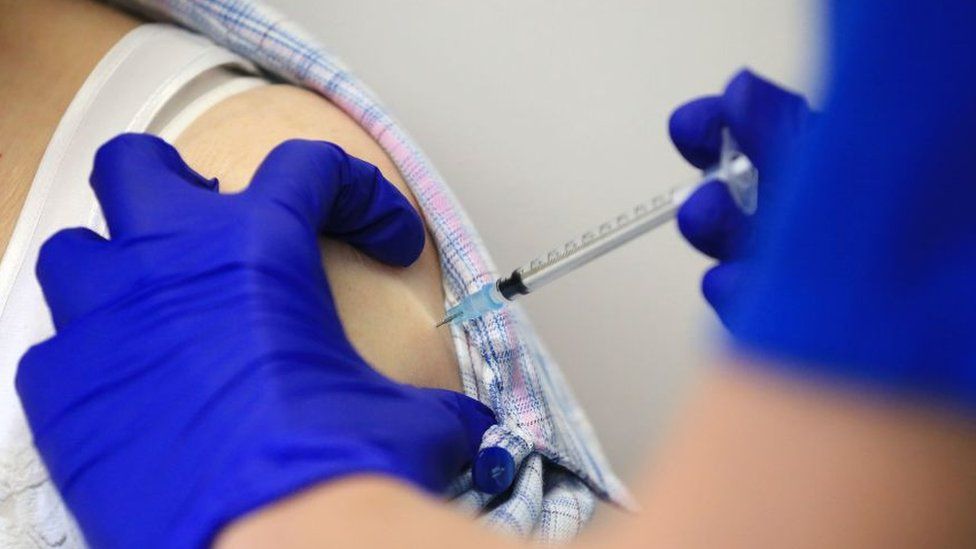
Covid vaccine rules are changing, but those most at risk will be offered another jab this autumn.
All adults aged 65 years and over will be offered the vaccine automatically, following advice from UK immunisation experts.
In 2022, boosters were offered to all people over 50.
Who can have an autumn Covid booster?
- Residents in care homes for older adults
- All adults aged 65 years and over
- People aged six months to 64 years in a clinical risk group
- Frontline health and social care workers
- People aged 12 to 64 who are household contacts of people with weakened immune systems
- People aged 16 to 64 who are carers and staff working in care homes for older adults
In autumn 2022, all over-50s were offered an extra dose, but the government’s advisers on vaccines recommended that only over-65s should automatically be included this year.
How do I book my Covid booster?
The NHS will contact those who are eligible.
People in England will be able to book their jabs through the NHS website, the NHS app or from 18 September by calling 119.
The government hopes that as many people as possible will be vaccinated by 31 October.
Scotland, Wales and Northern Ireland have also brought forward their booster rollouts.
As before, anyone also eligible for a free flu jab may receive it at the same time.
Which vaccine will people get?
Four different vaccines are in use across the UK: Pfizer-BioNTech, Moderna, Sanofi/GSK and Novavax.
All of them help to improve protection compared with earlier versions of the vaccines and give longer-term protection against getting seriously ill from Covid-19.
Most people can have any of them, but those who are pregnant, under 18 or over 75, will be offered a particular jab.
If you are not in one of those categories, you cannot choose which vaccine you get.
People are advised to take whichever they are offered, as all protect against severe illness or death.
How long after having Covid can I have a jab?
You should wait at least four weeks after a positive test, even if you had no symptoms.
You should not have a jab if you have a severe illness or high fever.
The vaccines do not infect people with Covid and cannot cause positive test results.
How many people have been vaccinated against Covid?
About 88% of people in the UK over the age of 12 (58 million) are thought to have had both a first and second dose of a vaccine, with 93% receiving a single jab.
A small number of people aged five to 11 (fewer than one million as of September 2022) had received a first and second dose of a coronavirus jab.
These numbers are based on the Office for National Statistics mid-year population estimates for 2021, and vaccine data from up to 7 May in Scotland and 5 May for the other UK nations.
How are the rules changing about who can get the Covid vaccine?
At the moment, primary vaccine doses are only available to children aged between six months and four years, who are at increased risk from Covid.
From autumn 2023, the Joint Committee on Vaccination and Immunisation has said only one jab will be needed to provide primary protection. Only people in the categories that are entitled to the autumn 2023 booster will be eligible for primary vaccination.
People with weakened immune systems may be entitled to additional doses.
What are the side effects of the Covid vaccine?
They are part of the body’s normal immune response to vaccination, and tend to resolve within a day or two.
Why it is normal for some people to experience short-term side effects from Covid-19 vaccines
It has also been listed as a rare possible side effect of the Novavax vaccine, after a very small number of cases were reported during clinical trials.
Patients with serious allergies should talk to their healthcare professional before being vaccinated.
What misinformation is there about Covid vaccines?
False and misleading claims about Covid vaccines have circulated online since they were first introduced. Most wrongly argue the jabs are not safe.
A number of social media accounts with lots of followers regularly misrepresent real stats and studies to do this.
Studies confirm young people do not have an increased risk of other heart problems after taking the vaccine.
Others strands of disinformation wrongly suggest that negative things that have happened to people after they were vaccinated were caused by the injection.

